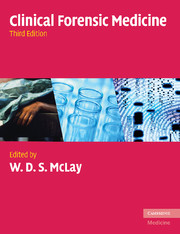Book contents
- Frontmatter
- Contents
- List of contributors
- Preface
- 1 Legal systems: a world view
- 2 Scottish legal system
- 3 The Police in the United Kingdom
- 4 The practitioner's obligations
- 5 The doctor in court
- 6 Custody medicine: physical conditions
- 7 Custody medicine: mental illness and psychological conditions
- 8 Substance misuse
- 9 Alcohol, drugs and driving
- 10 Injury
- 11 Child abuse: physical
- 12 Child abuse: sexual
- 13 Adult sexual offences
- 14 Management of at-risk exposures and infection control in custody
- 15 Scenes of crime
- 16 Forensic science
- 17 Forensic dentistry
- 18 Investigation of death
- 19 Dealing with a major disaster
- 20 Occupational health of police officers
- Index
- References
6 - Custody medicine: physical conditions
Published online by Cambridge University Press: 12 August 2009
- Frontmatter
- Contents
- List of contributors
- Preface
- 1 Legal systems: a world view
- 2 Scottish legal system
- 3 The Police in the United Kingdom
- 4 The practitioner's obligations
- 5 The doctor in court
- 6 Custody medicine: physical conditions
- 7 Custody medicine: mental illness and psychological conditions
- 8 Substance misuse
- 9 Alcohol, drugs and driving
- 10 Injury
- 11 Child abuse: physical
- 12 Child abuse: sexual
- 13 Adult sexual offences
- 14 Management of at-risk exposures and infection control in custody
- 15 Scenes of crime
- 16 Forensic science
- 17 Forensic dentistry
- 18 Investigation of death
- 19 Dealing with a major disaster
- 20 Occupational health of police officers
- Index
- References
Summary
Introduction
Forensic physicians (FPs) attend police custody suites to advise on immediate medical care for detained persons (DPs) and on any need for ongoing care during the detention period. They may be asked to assess adults' or juveniles' fitness for detention following arrest, to conduct a mental health assessment where custody is the place of safety, to examine children brought to a place of safety under a Police Protection Order, to advise on those detained by Immigration and to give medical guidance for those on remand or sentenced. Detained persons may need to be interviewed and/or charged and are commonly held overnight for court.
Guidance for the police in England, Wales and Northern Ireland is provided in the Police and Criminal Evidence Act 1984 (PACE). Revised Codes of Practice under the Act are published from time to time by the Stationery Office in, respectively, London and Belfast. Medical advice should be sought for those:
apparently suffering from a physical or mental illness;
needing assessment of problems related to substance misuse including alcohol;
who require medication;
injured before or during arrest;
who may be suffering from an infectious disease;
who request a doctor;
discharged to custody from hospital.
The Police and Criminal Evidence Act 1984 allows for clinical attention to be given by an appropriate healthcare professional (HCP) but, as this chapter is written primarily as guidance for doctors working in the custodial environment, it is written in the second person.
- Type
- Chapter
- Information
- Clinical Forensic Medicine , pp. 51 - 68Publisher: Cambridge University PressPrint publication year: 2009



